I know exactly when my relationship with alcohol changed. In my teens and early 20s, I had a healthy approach to alcohol and would only really drink socially and on weekends. But in 2005, at the age of 22, I got a really good job as head of marketing for an ecommerce company and began commuting from my home in Peterborough to London.
I never set out to drink so much alcohol, it just became my way of life. It was so easy. Because I was so quiet in my early 20s, I'd tell myself, wrongly, that when I drank I was more personable and loud. That became my "reason" to drink. I would go to a lunch meeting and have a beer, then I'd have an afternoon meeting and have another beer or two. And, because I lived an hour and a half away from London, I'd have another couple of beers on the train home and then sit in front of the TV with another 4 or 5 beers. Before long, I was drinking at least 10 beers every day.
At the time I thought all the decisions I was making were perfectly sane and sound. If I finished drinking at 11pm in London, rather than travel home I would sleep on the Circle Line of the London Underground; just go round and round until about 6am when I would get off the train and go and find another bar before work. That's not a logical, sensible thing to do. I was robbed many times. The sensible thing would have been to get a hotel room, I had plenty of money. When I did make the commute from London to Peterborough where I lived, I'd miss my station stop all the time and end up in Edinburgh or Leeds because I'd passed out.
But I'm fairly positive that 98 percent of the people I met didn't know I had been drinking all day because I was hitting my targets at work and getting promoted. I was then earning more money which made buying alcohol really easy.
I became aware it was an issue about 7 years into my time in London. I knew I was at the end of my tether because I was drinking three beers at lunch, three beers at my afternoon meeting and many more on my way home and in the evening. I was also hitting harder spirits and wine, because the more you drink the more tolerance you build up.
So, I left my job in London and said I was going to become a photographer. But it didn't happen, I was just at home drinking all day, every day. I gave myself a rule that I wouldn't drink before midday, because that way, I wasn't an alcoholic. My life for a good four years was drinking a bottle of Jack Daniels, a bottle of wine and 15-20 beers or ciders a day. I would get up at 11.30am, walk to the shop and buy alcohol and then fall asleep on the sofa having drunk all day. Now and again, I would take a break from alcohol for three or four days which I told myself meant I wasn't an alcoholic. Then I'd celebrate with a beer.
Of course, I didn't want anyone to know, so I tried to hide it. The store owner who sold me alcohol was probably the only person in the world who knew, and that was because they saw what I bought every morning. I didn't talk to anyone about my alcohol intake or go over the top if I was drinking with other people. But when I was on my own I'd just drink and drink. Everyone knew I enjoyed a beer, but I don't think they knew the extent of my drinking. If I saw my sister, who I am closest to in my family, I'd sit with her for an hour or two and have one beer because I was in a pub. I also didn't have a partner during my ten years of alcohol addiction; I was very much on my own for many years. I know now that I couldn't have been in a relationship, no one would have put up with me.
During my drinking phase, I also did no exercise. There aren't really any photos of me during those ten years, for good reason. I was drinking and eating too much and probably weighed 225lbs. I was a lot bigger than I am now. Now, I'm 170lb. I look back and realize that alcohol really controlled the way that I looked as much as the way I thought.
The breaking point for me was a holiday to Cornwall in 2014. The group of people I was with were drinking all day because they were on holiday. I, on the other hand, was fighting a mental battle because I knew by then that my drinking was out of control. I was trying not to drink and the people around me were constantly drinking and buying me alcohol. It completely broke me.

I went down to the beach on December 1, 2014 and I walked out and stood in the ocean fully clothed. I just didn't know what to do. I was staying at home all day, every day drinking; it wasn't a life. I will always remember that moment; just standing in the sea with no idea what to do. I then said something to myself that was the turning point for me. I told myself I had to try and not drink for one year, just to see what life was like. That became my challenge.
I walked out of the sea, got into my car and drove home from the holiday. Then, I locked myself in my house for two months. I couldn't leave, because if I went to a shop or walked by a pub, I would buy alcohol. I didn't want it but everything in me was saying: "drink." I ordered food in and it was a struggle not adding alcohol to my online cart, but it was easier than being in a shop.
Every day, I'd get up and my whole being would be telling me to go to the shop and buy alcohol. It was utterly horrendous. I had to try and shut that voice up and stay busy.
I'd always had the dream of becoming a photographer, so I practiced photography. It became an obsession. I watched YouTube videos and read anything I could get my hands on. I bought a few cameras and kept my mind busy by practicing. That's kind of what got me through it.
I didn't seek professional support, but looking back on it, I absolutely should have done. I know that now, but I was too ashamed to go and talk to anyone and thought I should deal with it by myself. Maybe I did it the hard way. It wasn't fun and it probably wouldn't work for a lot of people because it's not practical to shut yourself away from the world for two months. I'd always recommend for others to find help and talk about it. I wish I had.
The first time I left the house after two months, I drove for 5 hours to a beach in Cornwall, because the ocean is my safe, happy place. In a way, it is the worst and best place because it broke me, but it is where I made the best decision of my life.
As I ventured out into the world again, socializing became the hardest part. I would go to parties, meet my family for Sunday lunch, or meet friends in the pub who would have already bought me alcohol. In the early days I made excuses, but eventually I had to tell people I wasn't drinking anymore. Lots of people accepted it at face value and lots of people didn't and asked why. It's always the questioning that's the awkward part. Because then I have to either make excuses or give an honest answer, and the honest answer is not pretty.
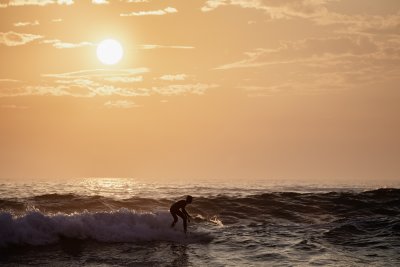

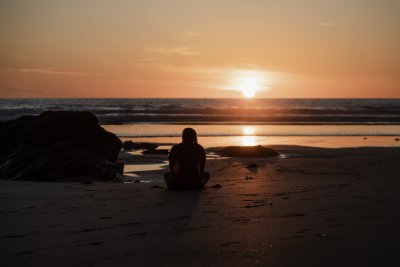
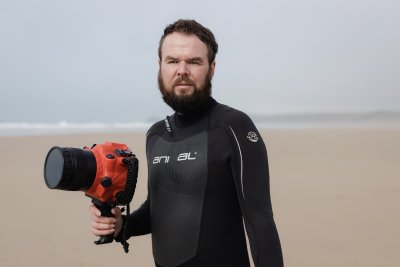
Around a month after I left the house, I met my new partner online. That brought with it a series of challenges, because she was a little bit of a party girl at the time and there I was, three months into not drinking. At the beginning I kept it to myself, but eventually I had to tell my partner my story. Because if we were going to be together she had to know. That was the hardest conversation I've had in my life. I was one month into meeting someone and I was essentially saying: "Hi, I'm Paul. I'm an alcoholic. I have not been sober very long and this is going to be a bumpy road, but please stick around." She did, and we have rules now to help us both. I'm not ashamed to call them rules. We don't have alcohol in the house and if we are given it as a gift, my partner keeps it in her car. It just takes that temptation away. I want her to enjoy her life and go out and have fun, and I never judge anyone else for drinking, but if she wants to have a big night, I will stay at home. These little rules help us know where the boundaries are.
When I got to the end of my first year of sobriety, I asked myself: "Is life better now?" I had a partner, my own business and I had bought my own house. One year is all it took for me to do all that.
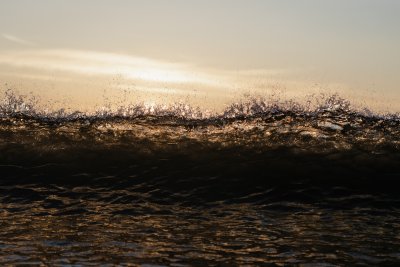

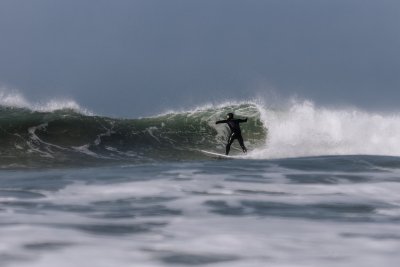
In those early days, obsessing over photography and then starting my photography business really kept me busy and sane, and it gave me something to work towards. I was a good photographer who knew a lot about marketing, so I got a lot of business through the door.
Then, in 2020, COVID happened and my business, which had included weddings and portraits, died overnight. At that time, my partner and I were spending every weekend in Cornwall by the ocean because it was my "happy place" and it's calm. We knew we had to build the business back up anyway, so we moved to Cornwall two years ago. Now, I spend each day out in the sea, wearing my swim fins, taking photographs of surfers and the waves and selling them as art prints. I have built a new kind of business centered around the ocean.
When I look back, I don't know how I've got to 7 years without alcohol. The idea of drinking is still the scariest thought. In my early days of giving up, I would have nightmares of having a beer. So I don't think I've solved it. My journey is 7 years in and it will go on for the rest of my life. I'm an alcoholic and of course I want a drink. It's still in me, I'm just of sound enough mind to say: "Don't drink, because you won't stop."
Since I gave up alcohol, my life has changed dramatically. Everything has improved. My decisions and my health are so much better. I have gone from drinking all day and not leaving my house, to having a partner, a family, a house, a business and living by the ocean. Nothing has gotten worse. And, it's easier to talk about now. Talking about my alcohol addiction is probably something I should have started doing five years ago.
If anyone else is at a point where they know they are drinking too much or that their drinking is out of control, I would say to them: find help; talk to someone. My decision making when I quit alcohol was so blurred and cloudy, but the more I talk to people now, the more I look back and think I should have done so at the time. Don't do it like I did; don't do it on your own. Because you don't need to, there is help out there. You're not at the end, you're at the beginning. It's the beginning of the rest of your life.
Paul David Smith is a photographer living in Cornwall. You can find out more about his work at pauldavidsmith.co.uk.
All views expressed in this article are the author's own.
As told to Jenny Haward.
Uncommon Knowledge
Newsweek is committed to challenging conventional wisdom and finding connections in the search for common ground.
Newsweek is committed to challenging conventional wisdom and finding connections in the search for common ground.





